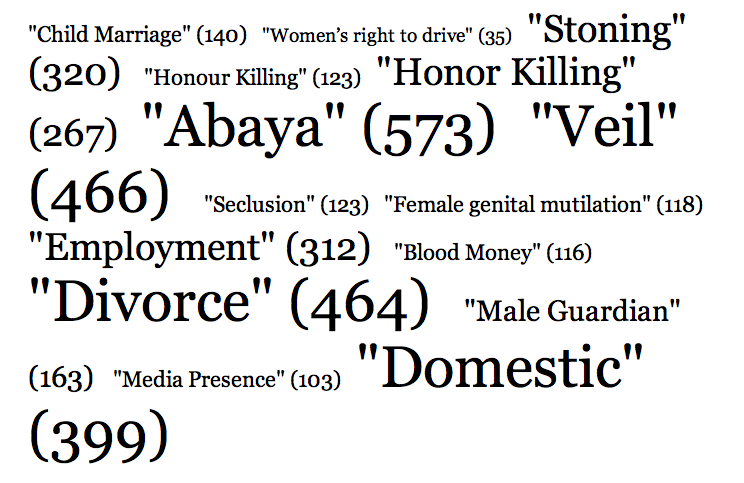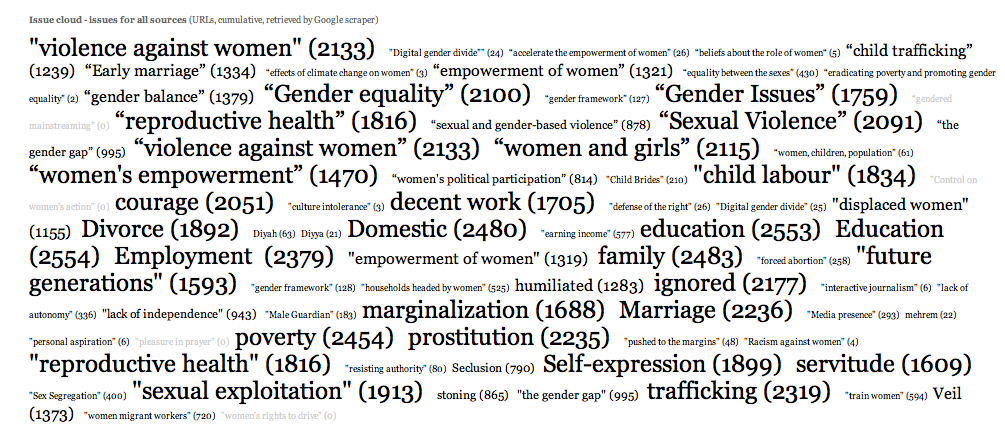Absence and Presence in Actor Language: Dealing with Women's Rights Issues Online A Saudi Arabian Case Study
Team Members
Chiara, Brittney, Magda, Hinna, and AlexResearch Question
There is no lack of research into the political blogosphere. Although the specifics of how political blogs effect social change remains controversial, it is generally assumed that political blogs drive change (Pole). In this assertion, there is an assumption that blogs provide a more 'authentic' voice as opposed to institutionally bound, 'less authentic' Intergovernmental and Non-Governmental Organizations (IGO/NGOs). These voices, many researchers claim, provide the framework for changing political, social and economic landscapes (Pole). Saudi Arabia has a thoroughly documenting history of violating international human rights standards. The Saudi government has banned all forms of political and civil rights gatherings, and there are no publicly known NGOs currently operating within the country (Ambah; Bernardi). There is, however, a growing movement of Saudi women's and human rights bloggers. Even with the emergence of this blogging community, many international institutions (both NGOs and IGOs included) have yet to take clear positions on women's rights in Saudi Arabia. Researchers have identified various religious, political, economic and traditional values in Saudi Arabia that have influence on women's position in Saudi society, but much less research has been done around how Saudi women are aggregating around these issues on the web. In our research, utilizing blogs the Saudi Women's Rights blogosphere, we ask, what kind of voices do the Saudi Women's rights blogs organize? How "authentic" is this voice, and does this voice differ from the dominant narratives of human rights IGO/NGOs? Secondly, are the issues addressed by the Saudi blogs being addressed by the IGO/NGOs?Method
1. Procured expert list of Saudi Women's Rights Blogs An initial list of Blogs was compiled based on an ongoing research (Bernardi). The blogs were identified in their relevance to women's rights issues in Saudi Arabia. The initial list of blogs was in English only and comprised 15 blogs, almost entirely written by women except for one blog (2 Americans living in the Kingdom, 1 Canadian living in Canada but discussing women´s issues in KSA, 1 virtual-NGO ran by a man, 1 Muslim Women´s Organisation based outside KSA but covering media presence and representation of women in KSA and the rest Saudi). 2. Compiled expert list of IGOs Using previous research from the Digital Methods Institute (Mapping the Global Human Rights Network), we started with the 44 identified IGO/NGOs and completed a manual analysis for all that listed either Women's Rights or Saudi Arabia as top-level issue areas. We further put in Saudi Arabia, Women, Women's Issues into search engine for the website. Also searched "saudi arabia" AND women's issues, "saudi arabia" AND women, "saudi arabia women's issues". If it was not procured, we deleted the website from our list. Thus we were left with a list of 26 websites. With those 26 websites, we did a further content analysis and picked out relevant themes, words and phrases that were mentioned in context of women's issues to find the actors' own language. The same type of content analysis was done on the list of blogs. From these respective findings we used our qualitative research hats and discussed at length the large list and narrowed it down to 86 terms. 3. Created Issuelist To quantitatively capture the areas of concern addressed by the blogs and IGO/NGOs, we created an issuelist to run the Issuecrawler for both the blogs and IGO/NGOs. Starting with a keyword list identified by Bernardi's research from the Saudi blogs we further tried to add data using the Digital Methods tools. We first used both the Issue Finder and Open Calais to try and find relevant keywords, however, we received no results. 4. Ran Google Scraper on list of keywords/phrases with the blogs. (See tag cloud.) Note: Looking at the querying results for each blog using Google Scraper, related to the first list of keywords, we realized that the maximum estimated number of results available for each question was 387 and we had asked for a maximum of 100. We ran Google Scraper again, but now asking for 500 results. We found some differences in the order of the top keywords in the previous and in the current results presented in Issue Cloud. The comparison of both estimated results allowed us to confirm which keywords are on the top and which are not. 5. Ran Google Scraper on list of keywords/phrases with the IGO/NGO websites. (See tag cloud.) We were able to use the Issue Crawler as of this morning to query our results. With respect to time and overhauling the Google Scraper, we only inputted the 18 main keywords into the Issue Crawler with respect to the list of IGO/NGO websites. Again, Issue Crawler results for the blogs were rendered previously. 6. Compare both Issue Language ListsPreliminary Findings
Issue List for IGOs and NGOs The final outcomes of the Issue Scraper highlighted the difference between the articulation of the issue "Women´s issues" in two different set of networks: International and Local.
The Issue Scraper on the list of blogs (local) defined issues that are related to women´s everyday lives in KSA. as it is possible to see when looking at the Issue Scraper Abaya, Veil, Divorce, Honor Killing (in the american version of the term, highlighting the high level of education of the writers) along with many other specific themes (right to drive) come to the fore. This confirms that the issues at stake in the blogs are identical to the issues at stake discussed outside the cybersphere, in literature and elsewhere.
Through the Issue Crawler it has also been able to see that the issue "women´s issues" as discussed in KSA is not displaced as in many other cases (cfr the case of women´s conditions in Iran or in Sudan) but stays within a specific, isolated network, with little or no links to International players specifically.
As for the international players (which include Governmental or Non Governmental Organisations) it is possible to see that some of the issues discussed in Saudi blogs are present with an even bigger resonance -as in the case of Veil, Employment, Divorce, FGM - confirming the International approach to the Issue "women´s issues". What is quite intersting to notice is that little attention is focused on Honour Killing (American or English variation) since it is considered, in literature, one of the main issues not only in Middle Eastern countries and not only in an Islamic context but more broadly in many other parts of the world.
As expected, Women´s right to drive is not considered an international concern but a KSA-specific one. This could be seen as confirmation that there is not one unified and universally represented "women´s issue" but one issue (in our case "women´s issues") can be differently articulated based on real-life experience (it could be even possible to say off-line experience). Which, in one sense, would avoid the dichotomy universalism vs particularism that is always discussed in academic discourses relating to feminism, women's issues and women's activism.
The final outcomes of the Issue Scraper highlighted the difference between the articulation of the issue "Women´s issues" in two different set of networks: International and Local.
The Issue Scraper on the list of blogs (local) defined issues that are related to women´s everyday lives in KSA. as it is possible to see when looking at the Issue Scraper Abaya, Veil, Divorce, Honor Killing (in the american version of the term, highlighting the high level of education of the writers) along with many other specific themes (right to drive) come to the fore. This confirms that the issues at stake in the blogs are identical to the issues at stake discussed outside the cybersphere, in literature and elsewhere.
Through the Issue Crawler it has also been able to see that the issue "women´s issues" as discussed in KSA is not displaced as in many other cases (cfr the case of women´s conditions in Iran or in Sudan) but stays within a specific, isolated network, with little or no links to International players specifically.
As for the international players (which include Governmental or Non Governmental Organisations) it is possible to see that some of the issues discussed in Saudi blogs are present with an even bigger resonance -as in the case of Veil, Employment, Divorce, FGM - confirming the International approach to the Issue "women´s issues". What is quite intersting to notice is that little attention is focused on Honour Killing (American or English variation) since it is considered, in literature, one of the main issues not only in Middle Eastern countries and not only in an Islamic context but more broadly in many other parts of the world.
As expected, Women´s right to drive is not considered an international concern but a KSA-specific one. This could be seen as confirmation that there is not one unified and universally represented "women´s issue" but one issue (in our case "women´s issues") can be differently articulated based on real-life experience (it could be even possible to say off-line experience). Which, in one sense, would avoid the dichotomy universalism vs particularism that is always discussed in academic discourses relating to feminism, women's issues and women's activism.
Literature
Ambah, F. S. (2008) "Saudi Activist Blogger Freed After 4 Months in Jail Without Charge," The Washington Post, http://www.washingtonpost.com/wp-dyn/content/article/2008/04/26/AR2008042601470.html. Bernardi, C. (2010) "Women 2.0: Egypt, Iran and Saudi Arabia," Conference presentation from Covering Iran: The role of conventional and non-conventional media, presented at SOAS University, 14 April 2010 Pole, A. (2010) bloggingthepolitical: politics and participation in a networked society. New York: Routledge.Data
- Picture_6-1.png:

| I | Attachment | Action | Size | Date | Who |
Comment |
|---|---|---|---|---|---|---|
| |
data_keywords_blogs_igos.xls | manage | 19 K | 08 Jul 2010 - 16:59 | BrittneyFosbrook | |
| |
tagcloud_blog_issuewords.png | manage | 85 K | 09 Jul 2010 - 11:39 | BrittneyFosbrook | |
| |
tagcloud_igongo_issuewords.tiff | manage | 980 K | 09 Jul 2010 - 11:21 | BrittneyFosbrook | IGO/NGO Issuelist Tagcloud |
| |
Picture_6-1.png | manage | 165 K | 09 Jul 2010 - 14:43 | MagdaOlszanowski |
This topic: Dmi > DmiSummerSchool > SummerSchool2010 > TrainingProgramProjects > TrainingProgramProjectNgo
Topic revision: 09 Jul 2010, MagdaOlszanowski
Topic revision: 09 Jul 2010, MagdaOlszanowski
 Copyright © by the contributing authors. All material on this collaboration platform is the property of the contributing authors.
Copyright © by the contributing authors. All material on this collaboration platform is the property of the contributing authors. Ideas, requests, problems regarding Foswiki? Send feedback

